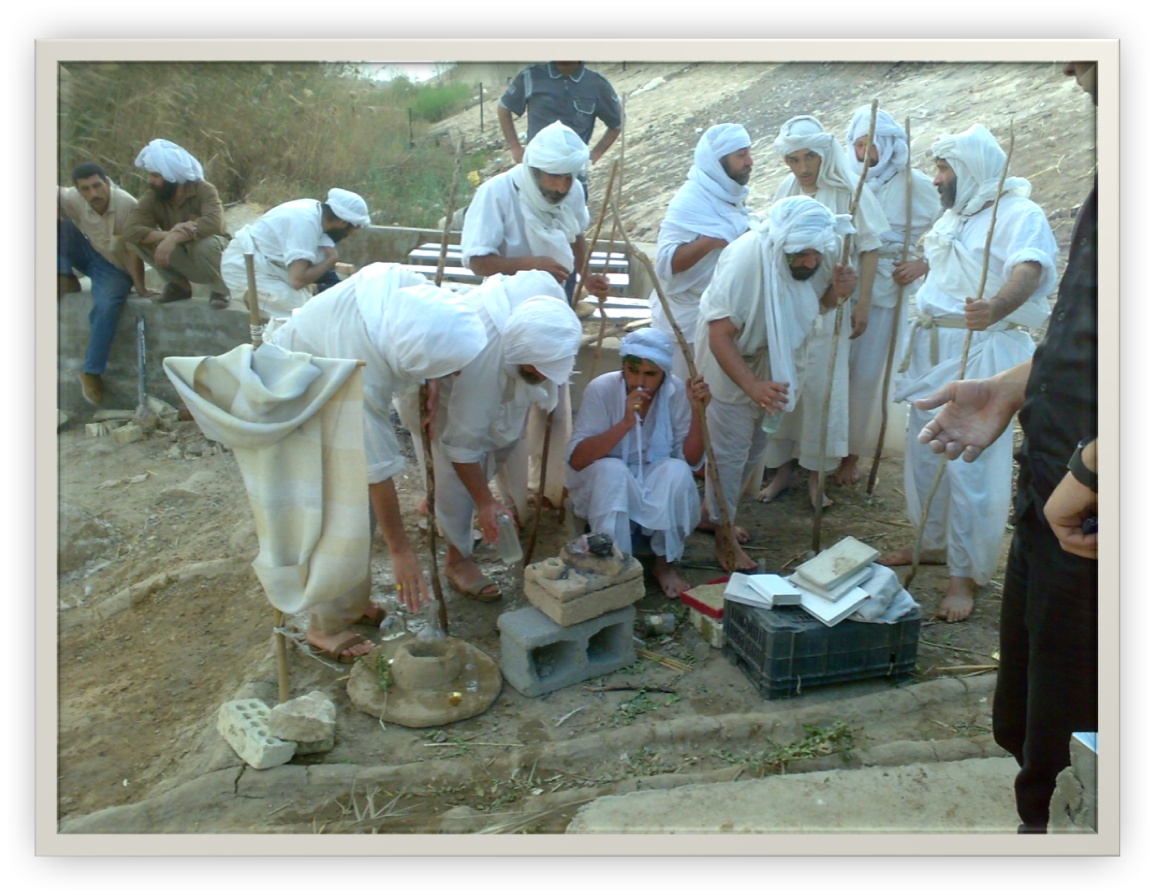Riha (Mandaeism) on:
[Wikipedia]
[Google]
[Amazon]
 In
In
 In
In Mandaeism
Mandaeism ( Classical Mandaic: ࡌࡀࡍࡃࡀࡉࡉࡀ ; Arabic: المندائيّة ), sometimes also known as Nasoraeanism or Sabianism, is a Gnostic, monotheistic and ethnic religion. Its adherents, the Mandaeans, revere Adam, Ab ...
, ''riha'' ( myz, ࡓࡉࡄࡀ) is incense
Incense is aromatic biotic material that releases fragrant smoke when burnt. The term is used for either the material or the aroma. Incense is used for aesthetic reasons, religious worship, aromatherapy, meditation, and ceremony. It may also ...
used for religious rituals. It is offered on stands called ''kinta'' by Mandaean priests
A Mandaean priest or ''Rabbi'' refers to an ordained religious leader in Mandaeism.
Overview
All priests must undergo lengthy ordination ceremonies, beginning with tarmida initiation. Mandaean religious leaders and copyists of religious texts ho ...
in order to establish '' laufa'' (communion) between humans in Tibil
In Mandaean cosmology, Tibil ( myz, ࡕࡉࡁࡉࡋ) or occasionally Arqa ḏ-Tibil (lit. "Tibil-Earth") is the Earth (World) or earthly middle realm. It is separated from the World of Light (''alma ḏ-nhūra'') above and the World of Darkness ( ...
(Earth) and uthra
An uthra or ʿutra ( myz, ࡏࡅࡕࡓࡀ; plural: ʿutri) is a "divine messenger of the light" in Mandaeism. Charles G. Häberl and James F. McGrath translate it as "excellency". Jorunn J. Buckley defines them as "Lightworld beings, called 'ut ...
s (celestial beings) in the World of Light
In Mandaeism, the World of Light or Lightworld ( myz, ࡀࡋࡌࡀ ࡖࡍࡄࡅࡓࡀ, translit=alma ḏ-nhūra) is the primeval, transcendental world from which Tibil and the World of Darkness emerged.
Description
*The Great Life ('' Hayyi Ra ...
during rituals such as the masbuta
Maṣbuta ( myz, ࡌࡀࡑࡁࡅࡕࡀ) is the ritual of immersion in water in the Mandaean religion.
Overview
Mandaeans revere John the Baptist and practice frequent baptism (''masbuta'') as a ritual of purification, not of initiation. They ar ...
(baptism) and masiqta
The masiqta ( myz, ࡌࡀࡎࡉࡒࡕࡀ) is a mass or ritual practiced in the Mandaean religion in order to help guide the soul ('' nišimta'') towards the World of Light in Mandaean cosmology. They are typically performed as funerary rites fo ...
(death mass), as well as during priest initiation ceremonies. Various prayers in the ''Qolasta
The Qolastā, Qulasta, or Qolusta ( myz, ࡒࡅࡋࡀࡎࡕࡀ; mid, Qōlutā, script=Latn) is the canonical prayer book of the Mandaeans, a Gnostic ethnoreligious group from Iraq and Iran. The Mandaic word ''qolastā'' means "collection". The ...
'' are recited when incense is offered. Incense must be offered during specific stages of the typically lengthy and complex rituals.
In the ''Qolasta''
Several prayers in the ''Qolasta
The Qolastā, Qulasta, or Qolusta ( myz, ࡒࡅࡋࡀࡎࡕࡀ; mid, Qōlutā, script=Latn) is the canonical prayer book of the Mandaeans, a Gnostic ethnoreligious group from Iraq and Iran. The Mandaic word ''qolastā'' means "collection". The ...
'' are recited when offering incense, including prayers 8 and 34.
See also
*Incense offering
The incense offering ( he, ) in Judaism was related to perfumed offerings on the altar of incense in the time of the Tabernacle and the First and Second Temple period, and was an important component of priestly liturgy in the Temple in Jerusa ...
in Judaism
* Incense offering in rabbinic literature
The incense offering ( he, קְטֹרֶת ketoret), a blend of aromatic substances that exhale perfume during combustion, usually consisting of spices and gums burnt as an act of worship, occupied a prominent position in the sacrificial legislatio ...
* Kyphi
Kyphi, cyphi, or Egyptian cyphi is a compound incense that was used in ancient Egypt for religious and medical purposes.
Word
Kyphi ( la, cyphi) is romanized from Greek κυ̑φι for Ancient Egyptian "kap-t", incense, from "kap", to perfum ...
in Ancient Egypt
* Religious use of incense
References
Mandaic words and phrases Incense Mandaean religious objects {{Mandaeism-stub